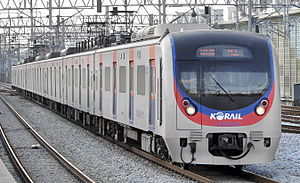| This article does not cite any sources. Please help improve this article by adding citations to reliable sources. Unsourced material may be challenged and removed. Find sources: "Korail Class 331000" – news · newspapers · books · scholar · JSTOR (May 2015) (Learn how and when to remove this message) |
| Korail Class 331000 | |
|---|---|
 Class 331000 train 331-06 arriving at Sangbong Station Class 331000 train 331-06 arriving at Sangbong Station | |
| In service | 2009-present |
| Manufacturer | Hyundai Rotem |
| Constructed | 2009 (1st batch) 2012-2014 (2nd batch) |
| Formation | 8 or 4 cars per train TC-M-M'-T-T-M-M'-TC |
| Operators | Korail |
| Depots | Munsan |
| Lines served | Gyeongui-Jungang Line |
| Specifications | |
| Car body construction | Steel |
| Doors | 4 per side, 8 per car |
| Maximum speed | 110 km/h (68 mph) |
| Traction system | Toshiba COVO52-A0 VVVF-IGBT propulsion system using IGBT 1C4M motors |
| Power output | 4,400 kW (5,900 hp) |
| Acceleration | 3.0 km/(h⋅s) (1.9 mph/s) |
| Deceleration | 3.5 km/(h⋅s) (2.2 mph/s) (service) 4.5 km/(h⋅s) (2.8 mph/s) (emergency) |
| Electric system(s) | 25 kV 60 Hz AC |
| Current collector(s) | Overhead |
| Safety system(s) | ATS |
| Coupling system | Shibata-type |
| Track gauge | 1,435 mm (4 ft 8+1⁄2 in) |
The Korail Class 331000 trains are commuter electric multiple units in South Korea used on the Gyeongui·Jungang Line. Class 331000 trains were manufactured and delivered in 2009 and from 2012 to 2014 to provide service on the Gyeongui Line and to address progressing extensions starting from the extension to Gongdeok Station.
Technical details
Electrical parts
All trains use IGBT controls and use passive cooling with a heat pipe. The trains are also equipped with regenerative braking, reducing energy consumption and simplifying train inspection, and they use electric door motors.
Interior design
The Class 331000 trains sport a white-colored, fire-retardant interior. LCD monitor displays are installed on the side of each car for trains 331-01~331-13, and on the top of each car for trains 331-14~331-27. The end cars have a space for wheelchairs.
Cabin
The Class 331000 trains share the same cabin design with the Class 321000 as many of the cars were derived from Class 331000 trains. Stop notifiers are installed, as are TGIS use color displays. Dead section notifiers are also installed.
Formation
The Class 331000 trains are organized into two formations
- Trains 331-01~331-13 and 331-23~331-27, in an eight-car TC-M-M'-T-T-M-M'-TC formation.
- Trains 331-14~331-22, in a four-car TC-M'-M'-TC formation.
The symbols are defined below.
- M' car: Pantograph, main transformer, controller, motor
- M car: Motor, controller
- TC car: Secondary power device, air compressor, battery, cabin
- T car: trailer (unpowered)
The cars of each train are numbered to correspond to the type of car each car is: 3310XX - Tc (SIV, air compressor, battery) 3311XX - M (inverter) 3312XX - M' (pantograph, transformer, inverter) 3313XX - T (trailer) 3314XX - T (trailer) (this car on trains 331-14~331-22 are M' cars) 3315XX - M (inverter) 3316XX - M' (pantograph, transformer, inverter) 3319XX - Tc (SIV, air compressor, battery)
Depot
The Class 331000 trains are stored at the Munsan train depot, which is a few kilometers south of Munsan Station.
Batches
1st batch

The first batch of Class 331000 trains were introduced in 2009 for the opening of what was known the Gyeongui Line at the time.
The first batch trains are numbered 331-01~331-13. The trains have new, smoother aluminium bodies, but they use the same front end design as the third batch Class 321000 trains. The first batch trains have LCD display monitors on the sides (above the doors).
2nd batch


The second batch of Class 331000 trains were introduced following the Gyeongui·Jungang Line's eastward extensions until Yongsan Station, when the Gyeongui Line became the Gyeongui·Jungang Line.
The second batch trains are numbered 331-14~331-27. The trains have LCD monitor displays are installed on the top of each car. The trains also use the same front end design as the third batch Class 321000 trains, but the exterior body was reverted to the standard, ribbed type stainless steel body seen on all new cars.
Train 331-27 was manufactured and delivered in late 2012 to address the extension from Digital Media City Station to Gongdeok Station. It was originally six cars long, but was lengthened to eight cars in November 2014.
Trains 331-14~331-22 were manufactured and delivered in late 2013 to expand the rolling stock on the (at the time) Gyeongui Line. These trains are only four cars long and operate on the Seoul Station branch of the Gyeongui·Jungang Line.
Trains 331-23~331-26 were originally manufactured in 2012, but each train was extended to eight cars in 2014. They were delivered in late 2014 address the extension from Gongdeok Station to Yongsan Station.
Derived units
The Korail Class 361000 trains use the 1st batch body design.
See also
References
| Current/Active |
| ||||||||||||||||||||
|---|---|---|---|---|---|---|---|---|---|---|---|---|---|---|---|---|---|---|---|---|---|
| Retired/Withdrawn |
| ||||||||||||||||||||
| Experimental |
| ||||||||||||||||||||
| See also Category:Rolling stock of South Korea | |||||||||||||||||||||